

Elsevier: Article Locator. Children's Hospital of Philadelphia. Other information on the causes of autism Genetics One of the best ways to determine whether a particular disease or syndrome is genetic is to examine the incidence in identical and fraternal twins.
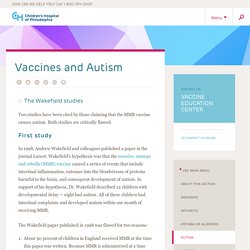
Using a strict definition of autism, approximately 60 percent of identical and 0 percent of fraternal twins have autism. Using a broader definition of autism (i.e. autistic spectrum disorder), approximately 92 percent of identical and 10 percent of fraternal twins have autism. Therefore, autism clearly has a genetic basis. "Home-movie" studies Clues to the causes of autism can be found in studies examining when the symptoms of autism are first evident. Home movies from children who were eventually diagnosed with autism and those who were not diagnosed with autism were coded and shown to developmental specialists. Timing of first symptoms Structural abnormalities of the nervous system Natural rubella infection References Adrien JL, Faure M, Perrot A, et al.
Adrien JL, Lenoir P, Martineau J, et al. Is The CDC Hiding Data About Mercury, Vaccines, And Autism? You know the rule.
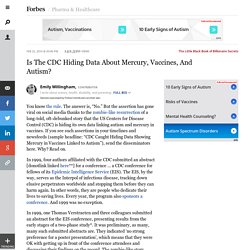
The answer is, “No.” But the assertion has gone viral on social media thanks to the zombie-like resurrection of a long-told, oft-debunked story that the US Centers for Disease Control (CDC) is hiding its own data linking autism and mercury in vaccines. If you see such assertions in your timelines and newsfeeds (sample headline: “CDC Caught Hiding Data Showing Mercury in Vaccines Linked to Autism”), send the disseminators here. Why? Read on. In 1999, four authors affiliated with the CDC submitted an abstract [donotlink linked here**] for a conference … a CDC conference for fellows of its Epidemic Intelligence Service (EIS).
In 1999, one Thomas Verstraeten and three colleagues submitted an abstract for the EIS conference, presenting results from the early stages of a two-phase study*. Conference abstracts and the accompanying data are almost always preliminary. Study Linking Childhood Vaccine And Autism Was Fraudulent. Jeff J.
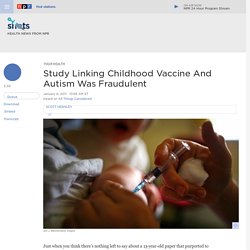
Mitchell/Getty Images Just when you think there's nothing left to say about a 13-year-old paper that purported to link childhood vaccination and autism, it turns out you're wrong. In the latest issue of BMJ, the British Medical Journal, investigative reporter Brian Deer makes the case that the infamous Lancet study, withdrawn last year, wasn't just wrong — it was fraudulent because key facts were altered to support the autism link. A case-control study of autism and mumps-measles-rubella vaccination using the general practice research database: design and methodology.
The General Practice Research Database (GPRD) The GPRD (previously known as the VAMP Research Bank) was set up in 1987 and is now held by the Medicines Control Agency [27,28].
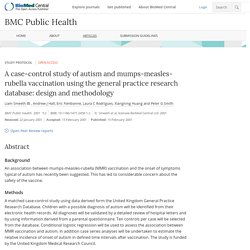
It contains complete prescribing and diagnostic information from a large number of general practices and is the largest source of continuous data on illness and prescribing habits in the United Kingdom. Wendy Chung: Autism — what we know (and what we don't know yet) A Message for the Anti-Vaccine Movement. The Autism-Vaccine Myth. Share By Emily Willingham and Laura Helft Posted 09.05.14 NOVA The assertion that vaccines could be linked to autism burst onto the international stage with the 1998 publication of a paper in the British journal The Lancet.
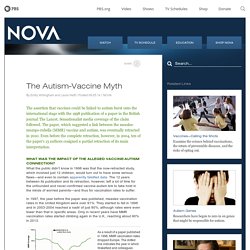
Sensationalist media coverage of the claim followed. The paper, which suggested a link between the measles-mumps-rubella (MMR) vaccine and autism, was eventually retracted in 2010. Even before the complete retraction, however, in 2004, ten of the paper's 13 authors cosigned a partial retraction of its main interpretation. What was the impact of the alleged vaccine-autism connection? What the public didn't know in 1998 was that the now-retracted study, which involved just 12 children, would turn out to have some serious flaws—and even to contain apparently falsified data.
In 1997, the year before the paper was published, measles vaccination rates in the United Kingdom were over 91%. As a result of a paper published in 1998, MMR vaccination rates dropped Europe. Vaccines Do Not Cause Autism Concerns. Autism spectrum disorder (ASD) is a developmental disability that is caused by differences in how the brain functions.
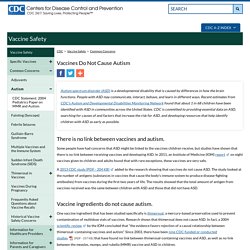
People with ASD may communicate, interact, behave, and learn in different ways. Recent estimates from CDC's Autism and Developmental Disabilities Monitoring Network found that about 1 in 68 children have been identified with ASD in communities across the United States.